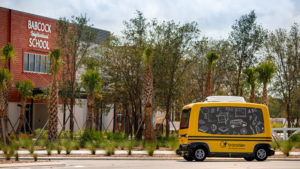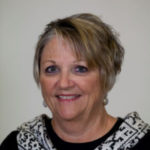This guest article for Safe Ride News was contributed by Lorrie Walker, Training and Technical Advisor of Safe Kids Worldwide.
Safe Kids Worldwide convened a Blue Ribbon Panel that met in April 2018 to highlight the need to address the safety of child occupants in autonomous vehicles (AVs). For this discussion, the panel defined “child” as one who is under age 13.

As autonomous vehicles are now being tested in over two dozen cities, little to nothing is known about how child occupant safety is, was, or will be tested and evaluated to assure appropriate protection of children at the same or higher level as adults. As a lead up to the in-person panel meeting in San Antonio, Texas, the 17 invited panelists spent several months narrowing and focusing on the issues. In addition, all CPS technicians were invited to participate in a survey to share their ideas, levels of interest (or disinterest), and questions they hoped the panel would address. More than 1,300 CPSTs participated in the survey.
The meeting yielded a “child-centered” call to action for AV developers and recommendations for the traffic safety field. Following the meeting, the issues were fine-tuned, resulting in the Blue Ribbon Panel report, Children in Autonomous Vehicles (pdf), released on October 17, 2018.
Panelists represented vehicle and CR manufacturers, child injury researchers, lawyers, law enforcement, special needs advocates, and the Governors Highway Safety Association, Children’s Hospital of Philadelphia, the Insurance Institute for Highway Safety, the American Academy of Pediatrics, the University of Michigan Transportation Research Institute, Johns Hopkins University, Consumer Reports, and Safe Kids. The panel also included two former NHTSA administrators.
It was agreed that Safe Kids would continue to oversee the work of the panel going forward. Plans for 2019 include involving interaction with developers and the component side of the industry. Safe Kids will convene a consortium of those interested in contributing to and advancing the panel’s recommendations, measuring local or state activity.
This will be a long process, and we encourage advocates to become educated, follow the news, and keep asking, “What about children?”
To learn how you can be involved, contact Lorrie Walker at lwalker@safekids.org. Find the full report here (pdf).
 —Lorrie Walker
—Lorrie Walker
Training and Technical Advisor
Safe Kids Worldwide
